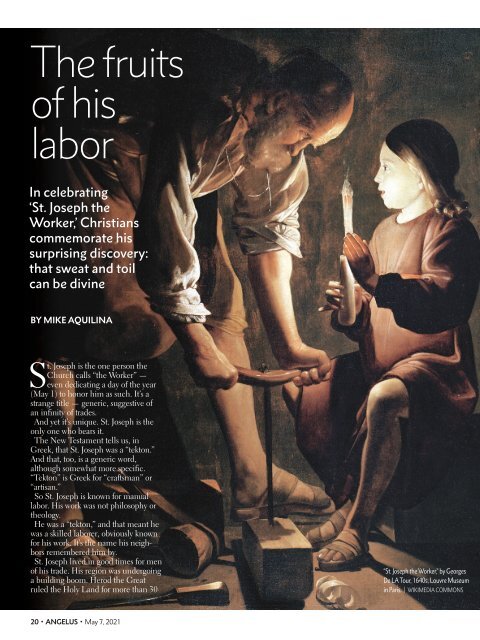Create successful ePaper yourself
Turn your PDF publications into a flip-book with our unique Google optimized e-Paper software.
The fruits<br />
of his<br />
labor<br />
In celebrating<br />
‘St. Joseph the<br />
Worker,’ Christians<br />
commemorate his<br />
surprising discovery:<br />
that sweat and toil<br />
can be divine<br />
BY MIKE AQUILINA<br />
St. Joseph is the one person the<br />
Church calls “the Worker” —<br />
even dedicating a day of the year<br />
(<strong>May</strong> 1) to honor him as such. It’s a<br />
strange title — generic, suggestive of<br />
an infinity of trades.<br />
And yet it’s unique. St. Joseph is the<br />
only one who bears it.<br />
The New Testament tells us, in<br />
Greek, that St. Joseph was a “tekton.”<br />
And that, too, is a generic word,<br />
although somewhat more specific.<br />
“Tekton” is Greek for “craftsman” or<br />
“artisan.”<br />
So St. Joseph is known for manual<br />
labor. His work was not philosophy or<br />
theology.<br />
He was a “tekton,” and that meant he<br />
was a skilled laborer, obviously known<br />
for his work. It’s the name his neighbors<br />
remembered him by.<br />
St. Joseph lived in good times for men<br />
of his trade. His region was undergoing<br />
a building boom. Herod the Great<br />
ruled the Holy Land for more than 30<br />
“St. Joseph the Worker,” by Georges<br />
De LA Tour, 1640s, Louvre Museum<br />
in Paris. | WIKIMEDIA COMMONS<br />
20 • ANGELUS • <strong>May</strong> 7, <strong>2021</strong>


















